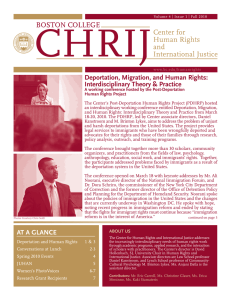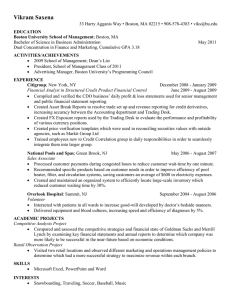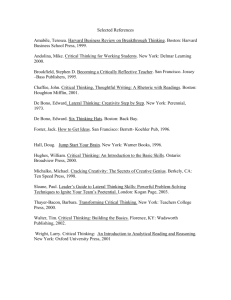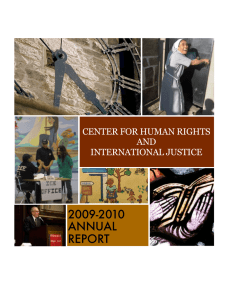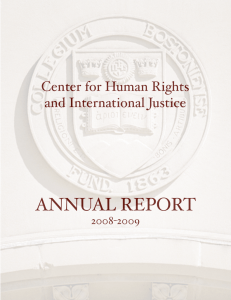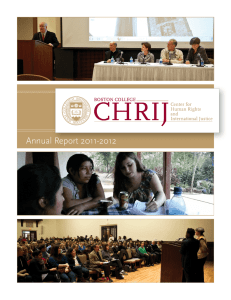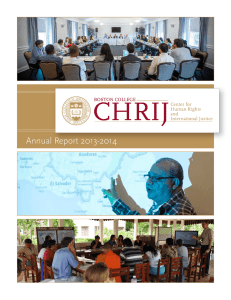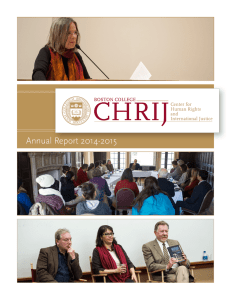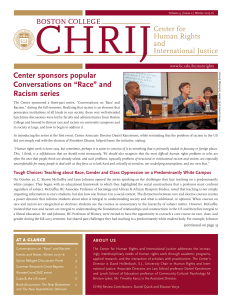EDUCATIONAL PROGRAMS RESEARCH/EDUCATIONAL PROJECTS Post-Deportation Human Rights Project
advertisement
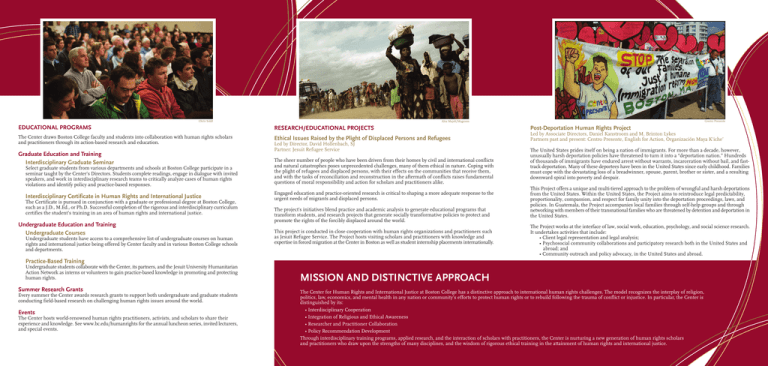
Chris Soldt RESEARCH/EDUCATIONAL PROJECTS The Center draws Boston College faculty and students into collaboration with human rights scholars and practitioners through its action-based research and education. Ethical Issues Raised by the Plight of Displaced Persons and Refugees Graduate Education and Training Interdisciplinary Graduate Seminar Led by Director, David Hollenbach, SJ Partner: Jesuit Refugee Service Select graduate students from various departments and schools at Boston College participate in a seminar taught by the Center’s Directors. Students complete readings, engage in dialogue with invited speakers, and work in interdisciplinary research teams to critically analyze cases of human rights violations and identify policy and practice-based responses. The sheer number of people who have been driven from their homes by civil and international conflicts and natural catastrophes poses unprecedented challenges, many of them ethical in nature. Coping with the plight of refugees and displaced persons, with their effects on the communities that receive them, and with the tasks of reconciliation and reconstruction in the aftermath of conflicts raises fundamental questions of moral responsibility and action for scholars and practitioners alike. Interdisciplinary Certificate in Human Rights and International Justice Engaged education and practice-oriented research is critical to shaping a more adequate response to the urgent needs of migrants and displaced persons. The Certificate is pursued in conjunction with a graduate or professional degree at Boston College, such as a J.D., M.Ed., or Ph.D. Successful completion of the rigorous and interdisciplinary curriculum certifies the student’s training in an area of human rights and international justice. Undergraduate Education and Training Undergraduate Courses Undergraduate students have access to a comprehensive list of undergraduate courses on human rights and international justice being offered by Center faculty and in various Boston College schools and departments. Centro Presente Alex Majoli/Magnum EDUCATIONAL PROGRAMS The project’s initiatives blend practice and academic analysis to generate educational programs that transform students, and research projects that generate socially transformative policies to protect and promote the rights of the forcibly displaced around the world. This project is conducted in close cooperation with human rights organizations and practitioners such as Jesuit Refugee Service. The Project hosts visiting scholars and practitioners with knowledge and expertise in forced migration at the Center in Boston as well as student internship placements internationally. Post-Deportation Human Rights Project Led by Associate Directors, Daniel Kanstroom and M. Brinton Lykes Partners past and present: Centro Presente, English for Action, Organización Maya K’iche’ The United States prides itself on being a nation of immigrants. For more than a decade, however, unusually harsh deportation policies have threatened to turn it into a “deportation nation.” Hundreds of thousands of immigrants have endured arrest without warrants, incarceration without bail, and fasttrack deportation. Many of these deportees have been in the United States since early childhood. Families must cope with the devastating loss of a breadwinner, spouse, parent, brother or sister, and a resulting downward spiral into poverty and despair. This Project offers a unique and multi-tiered approach to the problem of wrongful and harsh deportations from the United States. Within the United States, the Project aims to reintroduce legal predictability, proportionality, compassion, and respect for family unity into the deportation proceedings, laws, and policies. In Guatemala, the Project accompanies local families through self-help groups and through networking with members of their transnational families who are threatened by detention and deportation in the United States. The Project works at the interface of law, social work, education, psychology, and social science research. It undertakes activities that include: • Client legal representation and legal analysis; • Psychosocial community collaborations and participatory research both in the United States and abroad; and • Community outreach and policy advocacy, in the United States and abroad. Practice-Based Training Undergraduate students collaborate with the Center, its partners, and the Jesuit University Humanitarian Action Network as interns or volunteers to gain practice-based knowledge in promoting and protecting human rights. Summer Research Grants Every summer the Center awards research grants to support both undergraduate and graduate students conducting field-based research on challenging human rights issues around the world. Events The Center hosts world-renowned human rights practitioners, activists, and scholars to share their experience and knowledge. See www.bc.edu/humanrights for the annual luncheon series, invited lecturers, and special events. MISSION AND DISTINCTIVE APPROACH The Center for Human Rights and International Justice at Boston College has a distinctive approach to international human rights challenges. The model recognizes the interplay of religion, politics, law, economics, and mental health in any nation or community’s efforts to protect human rights or to rebuild following the trauma of conflict or injustice. In particular, the Center is distinguished by its: • Interdisciplinary Cooperation • Integration of Religious and Ethical Awareness • Researcher and Practitioner Collaboration • Policy Recommendation Development Through interdisciplinary training programs, applied research, and the interaction of scholars with practitioners, the Center is nurturing a new generation of human rights scholars and practitioners who draw upon the strengths of many disciplines, and the wisdom of rigorous ethical training in the attainment of human rights and international justice. ABOUT US Director David Hollenbach, S.J., University Chair in Human Rights and International Justice David Hollenbach teaches courses in human rights; ethics, religion and international politics; contemporary theories of justice; and humanitarian crises and refugees. His research interests are in the foundations of Christian social ethics, especially human rights in the context of humanitarian crises and the displacement of refugees, as well as the role of religion in political life. Associate Directors Reuters Participatory Action Research in Post-Katrina New Orleans Led by Associate Director, M. Brinton Lykes Partners: Catholic Charities, New Orleans and Kingsley House In 2005, soon after Hurricane Katrina hit the United States coastline, levees surrounding the low-lying city of New Orleans collapsed, flooding and devastating the area. Despite multiple recovery efforts and several years later, New Orleans neighborhoods still lack many basic services. Displaced New Orleanians and newly arrived immigrants, and all affected by the complex reality of Katrina and its aftermath, face a set of socio-emotional challenges that involve not only personal recovery, but collective healing and social redress. Women have been particularly affected yet also evidence new forms of leadership. In the post-Katrina context, this involves addressing structural racism affecting African-Americans before, during, and after the crisis. It also means connecting marginalized and dis-empowered people who share similar struggles, including the historic African-American and the newly arrived and growing Latino communities. As women from these groups begin to connect with one another, they are together identifying cultural, social, and community-based strengths and strategies to employ in their recovery and healing processes, and in designing new forms of cross-community leadership. This project addresses the needs of displaced and newly migrated African-American and Latina New Orleanians. By using participatory action research and photovoice methodologies, researchers and community members engage in narrative documentation, cross-racial dialogue, and social and political advocacy. Daniel Kanstroom, Professor of Law, Director, International Human Rights Program at Boston College Law School Daniel Kanstroom teaches Immigration and Refugee Law, International Human Rights Law, and Administrative Law. His research interests include comparative citizenship, immigration and deportation law, criminal law, and international human rights law. M. Brinton Lykes, Professor of Community Cultural Psychology, Lynch School of Education M. Brinton Lykes teaches participatory action research at the Lynch School of Education. Her research interests include gender, culture, and the effects of state-sponsored terror, organized violence, and unnatural disasters; human rights policy and mental health interventions; and participatory action research and community-based strategies for change. Maryanne Loughry, RSM, Research Professor Maryanne Loughry is Associate Director of Jesuit Refugee Service Australia and research scholar at Boston College. She supports educational and research programs on issues ranging from forced migration to immigration at the Center. The Center hosts visiting scholars and collaborates with affiliated faculty from various disciplines on human rights research both within Boston College and at other universities. PARTNERSHIP Ignacio Martín-Baró Fund for Mental Health and Human Rights The Martín-Baró Fund was established to honor the memory of Father Ignacio Martín-Baró, a Jesuit priest and social psychologist who was murdered in El Salvador in 1989. The Fund makes grants to support progressive, grassroots groups who are challenging institutional repression and confronting the mental health consequences of violence and injustice in their communities across the world. In 2009, the Center and the Fund entered into a partnership to promote education and critical awareness about the consequences of social injustice on individuals and communities. The Center manages the Fund’s educational programming and offers opportunities for student involvement in the grant making process as well as with the work of the grantee organizations. Center for Human Rights and International Justice Boston College 140 Commonwealth Avenue, Chestnut Hill, MA 02467 617-552-1968 “To loose the bonds of injustice… To let the oppressed go free.” Isaiah 58:6 humanrights@bc.edu www.bc.edu/centers/humanrights Cover montage photo credits: Top Left: Dreaming Home, Betty LaDuke Top Right: Centro Presente Bottom Left: Post-Katrina Photo PAR Project Participants Bottom Right: ©istockphoto.com/claudiad www.bc.edu/centers/humanrights

